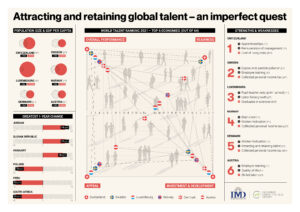Workers today are increasingly motivated by high quality of life, flexible working, and opportunities to train on the job, whereas previously, remuneration was the driving force behind their desire to stick at their jobs.
This is a major finding in 2021’s IMD World Talent Ranking, which each year measures worker motivation, quality of life, and employee training as three criteria among 31. Responses to questions on these criteria are among those gathered in a survey of executives in 64 economies across the world, and placed alongside hard data to form the bigger picture.
“The results have consequences for leadership responsibilities, as it’s clear that talent attraction and retention is no longer just a policy issue. It’s also the responsibility of senior executives who need to realize their role in boosting worker motivation, which is not just driven by external factors such as salary, safety, or quality of life, but also by the opportunities leaders can provide for workers to work flexibly and to have the use of the best tech at their fingertips,” said Arturo Bris, Director of the IMD World Competitiveness Center (WCC), which is behind the research.
“The competence and international experience of managers is key to sustaining motivation. Other contributing factors to worker motivation in highly talent-competitive countries include retraining opportunities for staff,” added Christos Cabolis, the WCC’s Chief Economist.
Could motivation from pay checks fade into the background?
Talent competitiveness in the Ranking is measured by taking data and survey replies across three areas: (1) Investment & Development – a measurement of resources earmarked to cultivate a homegrown workforce (2) Appeal – the extent to which an economy attracts foreign and retains local talent; and (3) Readiness – what the quality of the skills and competencies that are available in a country’s talent pool are like.
In terms of overall positioning, Switzerland is 1st (for the fifth year in a row), Sweden is 2nd (up from 5th in 2020 in the same ranking) and Luxembourg 3rd (also 3rd in 2020). Worker motivation itself was highest in Denmark, followed by Norway, then Austria.
The WCC researchers asked executives in 64 economies how high they perceived worker motivation to be. Taken as a median of the top 10 ranking economies, the answer out of 10 has evolved from 6.1 to 7.5 between 2020 and 2021. The least talent-competitive economies showed a decrease in motivation. In 2020, the median answer was 5.7 vs 5.3 this year.
This year’s results shed light on the challenges and solutions around job creation and re-employment at a time in which much hype surrounds the Great Resignation phenomenon, by which workers in the US are increasingly unwilling to accept jobs, at least at pre-COVID wages.
“The fact that these people have found other values in life has economic consequences. Keeping people in jobs is paramount and really understanding peoples’ new motivations to work will be a big part of this in 2022,” Bris concluded.




